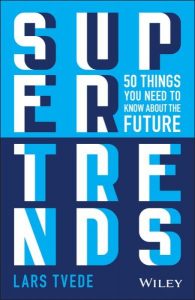It’s hard to imagine and take into account changes that happen slowly but surely. Their overall impact can be radical for our lifestyle yet we tend to either ignore or underestimate the signals along the way.
Supertrends reminds us to look into those lingering things that barely move when you focus on them but are huge when compared to the already happened historical changes.
The book covers large topics and introduces 50 rule of thumbs to crystallise their impact on us. Probably the biggest message is that the world is overall a way better place than general population and even experts believe. Hans Rosling used to quiz various audiences, and pure chance deals better odds (more optimistic) than his sample audience ever achieved with their knowledge of the facts.
One of the change factors is productivity that is moving from manual work to mechanical and finally to digital. The latter enables exponential growth compared to previous linear and static. When we include the fact that the still growing (but slowing) global population has more resources available to each person it is no wonder that there is no limit to the innovation potential we can achieve (provided that the laws of physics allow them).
Accenture has predicted that AI can double the economic growth rate in rich countries. This is huge, and it results large societal changes in all aspects of our life. The lower levels of Maslow’s hierarchy will be occupied by automatised machines that carry out commodity production, administration and distribution tasks.
Experience economy and labour-of-love type of work will increase and shift the focus of people’s work and consumption preferences.
The nature of work will also transcend from permanent one employer type of relationship towards continuous learning and flexible work arrangements. Last decade was the rise of social media. Individual voices have become so strong that showing your full identity will become acceptable in comparison to the still prevalent work-life separation (see also Category creation where Anthony Kennada talks about human-centric approach to business).
Frederic Laloux divides organisations into five category types ranging from impulsive, conformist, achievement to pluralistic and evolutionary. Public services are mainly based on the conformist management style: hierarchical, fixed roles and processes, authoritarian and formality/status driven.
Many companies have moved towards the pluralistic management that is culture and value driven with inclusive, fair and broad impact focused. Yet, the future seems to move into direction where self-organisation, -management, -motivation and decentralised planning are the norm. This decentralisation provides greater flexibility but required more trust and individual responsibility.
The drift between last century top-down rigid structures and requirements for more dynamic and customised solutions become very apparent in the public sector. It continues to hoard more resources without increasing productivity and efficiency to justify the ever-larger societal tax burdens. This results that the future winners will be countries that adapt to the pluralistic and evolutionary managerial styles in their provision of public services for their residents. Government as a platform is something that some leading countries in this field are already experimenting with (e.g. Estonia). The main challenge is to institutionalise agility and innovation.
It’s humbling to consider that our scientific activity increases 100-fold in 100 years. How much has the world changed since the 1920’s? The challenges of the future are rarely solved with the technologies of today (rule #4). Our current non-sustainable practices will become non-issues and replaced with something new and different.
Future is non-linear, often exponential in change and based on continuous human innovation and productivity.

